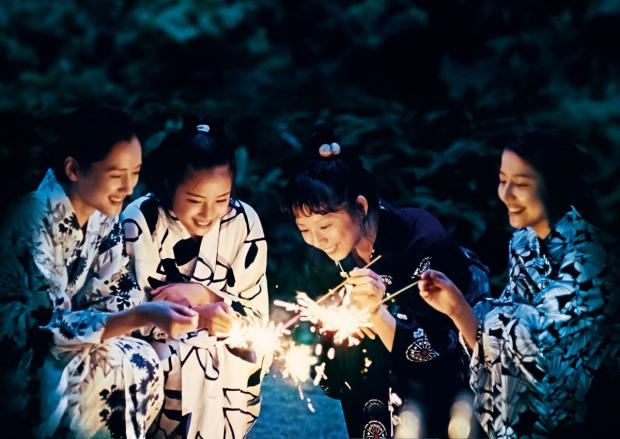Our Little Sister
The title of Hirokazu Kore-eda’s frequently lovely and restrained Our Little Sister may have a Chandlerian ring of detective fiction for some, but that is far removed from this film’s aesthetic and storyline. Kore-eda (Nobody Knows, After Life) focuses on a subdued depiction of the ordinary and intimate details of family life, friendship, and love. His film is also about personal history and memory. But unlike many other film and literary artists, Kore-eda doesn’t build to melodramatic peaks or give us characters who are involved in or succumb to serious rancor or histrionics. There are issues, but they’re only gradually addressed, with little dramatic punctuation. Sometimes he seems to leave his characters in stasis or irresolution, but this impression is deceptive. Resolutions come, eventually.
It was probably inevitable that the picture would evoke comparisons to the plays of Anton Chekhov (as in the New York Times’ A. O. Scott’s review), but the resemblance is slight. Kore-eda doesn’t create the neurotic tension that so often develops in Chekhov. There are three sisters in the movie, but they’re a long way from the playwright’s siblings and their tortured yearning to leave rural Russia for Moscow. Nor does Kore-eda use his characters as human metaphors for widespread social entropy. He’s not interested in social decay. Our Little Sister deals gently with interpersonal and community ties.
The movie’s family is untraditional and asymmetrical. Early on, three sisters in their 20s travel from the seaside Japanese town of Kamakura to the countryside for the funeral of the father they’re had virtually no contact with for 15 years. There they meet their 14-year-old half sister Suzu (Suzu Hirose). Responding to the girl’s dignified, polite personality, they impulsively invite her to live with them and she gratefully accepts, moving into the sisters’ rambling old house that was left to them by their grandmother.
Kore-eda, who also wrote and edited this very handsomely constructed film, chronicles four seasons of Suzu and her half sisters’ lives in and out of this family grouping. A recurring thematic device develops around the family tradition of making wine from their own plum tree. Stored beneath their kitchen floor are jars of various vintages of the wine, dating back to their grandmother’s day. The wine figures in the consequences of a visit from the three sisters’ mother, who also left them to pursue her own life.
This visit provides relatively heated dramatic moments, but even here Kore-eda avoids high-impact dramatics. He allows emotion into this scene and some others, but not high-pitched melodrama. There are sadness, troubled memories, and the serious illness of a friend and surrogate maternal figure to the sisters. The eldest, Sachi (Haruka Ayase), must deal with conflicts of love and career.
Our Little Sister is one of the most visually impressive films you’re likely to see for some time. In an often elegantly rendered seaside setting, Kore-eda steadily creates an impression of challenged but enduring family connections and of a community.
About halfway through the movie, I wrote in my notebook, “But nothing’s happening!” Our Little Sister requires some patience, more than some people will want to summon. But more was going on in it than I at first discerned. It opens Friday at the Dipson Eastern Hills.

